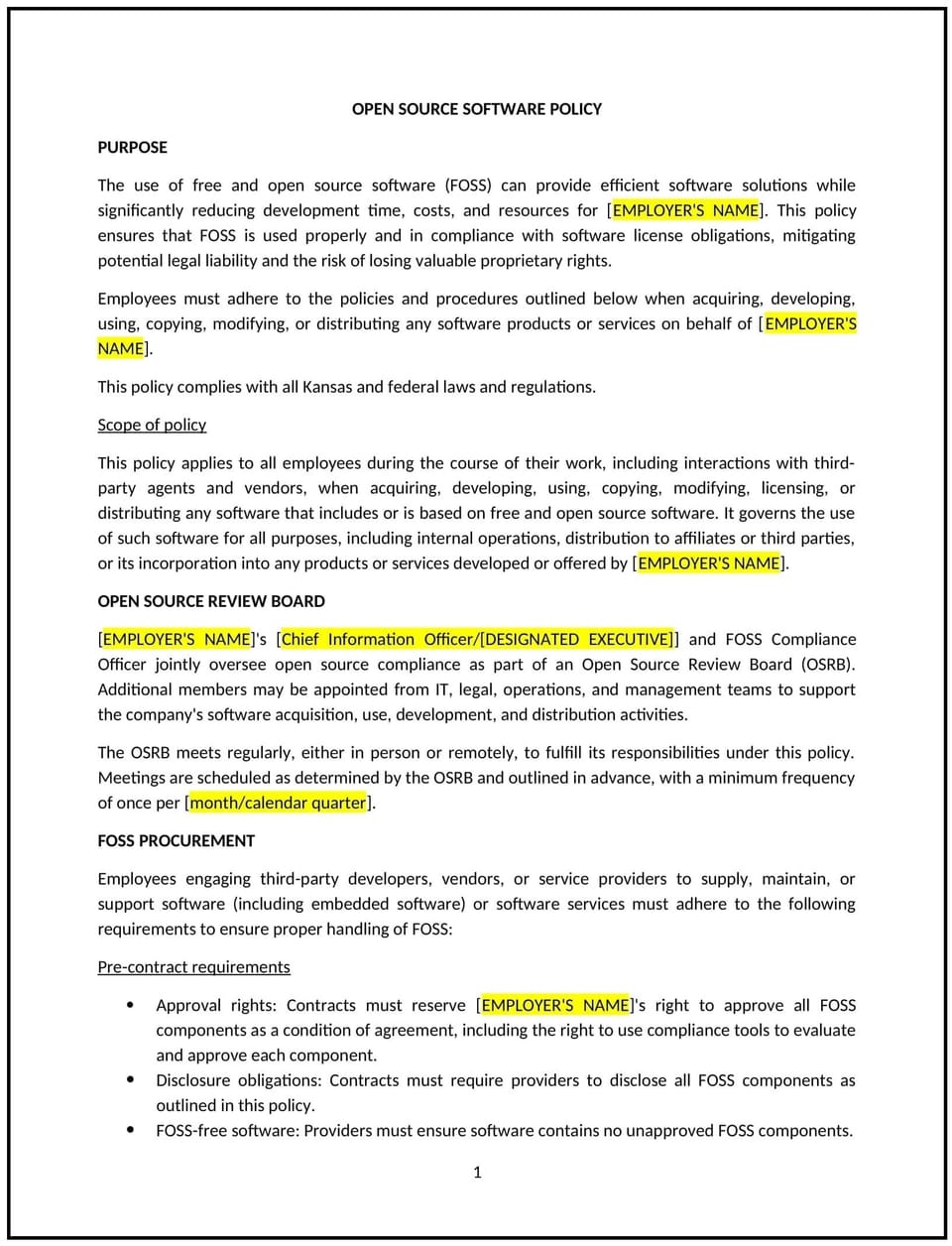Open source software policy (Kansas): Free template

Open source software policy (Kansas)
An open source software policy helps Kansas businesses establish guidelines for using, contributing to, and distributing open source software. This policy outlines how the company will manage the use of open source software within its operations, ensure legal compliance, and protect the organization’s intellectual property.
By implementing this policy, businesses can foster innovation, reduce software costs, and ensure that their use of open source software aligns with legal requirements and company goals.
How to use this open source software policy (Kansas)
- Define open source software: Businesses should provide a clear definition of open source software and describe the types of licenses that are acceptable for use within the company.
- Establish approval processes: Businesses should implement a process for approving the use of open source software, ensuring that it aligns with the company’s needs and complies with licensing requirements.
- Address contributions to open source projects: Employees contributing to open source projects should follow company guidelines regarding intellectual property, confidentiality, and the use of company resources for such contributions.
- Identify licensing obligations: Businesses should specify the legal obligations associated with open source software licenses, such as the need to provide attribution, make modifications publicly available, or share source code.
- Prevent conflicts with proprietary software: The policy should clarify that open source software must not conflict with the use of proprietary software or intellectual property owned by the business or its partners.
- Ensure compliance with security standards: Businesses should assess open source software for potential security vulnerabilities and ensure that any software used meets the company’s security standards.
- Review and update regularly: Businesses should periodically review the policy to ensure it remains aligned with evolving open source licensing practices, legal requirements, and technological changes.
Benefits of using an open source software policy (Kansas)
- Reduces costs: By leveraging open source software, businesses can reduce software licensing costs and access a wealth of free, high-quality tools and resources.
- Encourages innovation: Open source software fosters creativity and collaboration, allowing businesses to innovate and customize solutions to meet their specific needs.
- Protects intellectual property: A clear policy helps businesses manage the risks of using open source software, protecting proprietary code and ensuring compliance with licensing terms.
- Maintains legal and security compliance: An open source software policy helps businesses avoid legal risks and ensures that open source software is used safely, minimizing exposure to vulnerabilities.
- Promotes transparency: By contributing to open source projects, businesses can enhance their reputation as a responsible corporate entity that supports the open-source community.
- Supports scalability: Open source software can be more easily scaled and adapted to suit the growing needs of a business, providing flexible solutions that evolve with the company.
Tips for using this open source software policy (Kansas)
- Communicate the policy clearly: Businesses should ensure that all employees are aware of the open source software policy and understand the importance of adhering to licensing requirements.
- Implement training: Employees should receive training on how to use, contribute to, and manage open source software in a way that protects the business’s interests.
- Regularly review open source software usage: Businesses should periodically audit the open source software used within the company to ensure compliance with the policy and security standards.
- Keep track of licenses: Businesses should maintain a central repository or system to track the licenses for open source software being used or contributed to, ensuring that all obligations are met.
- Maintain a balance: Businesses should encourage the use of open source software where appropriate but be cautious about its integration with proprietary software to prevent conflicts.
Q: Why should Kansas businesses implement an open source software policy?
A: Businesses should implement an open source software policy to manage the use and contributions to open source software, ensuring legal compliance, protecting intellectual property, and promoting cost-effective solutions.
Q: What types of open source software are acceptable under this policy?
A: The policy should outline the types of open source software licenses that are acceptable for use, such as permissive licenses like MIT, Apache, or BSD, and specify any restrictions or conditions on use and modification.
Q: How can businesses ensure they are complying with open source software licenses?
A: Businesses should establish a process for reviewing the terms of open source licenses, track the software being used, and ensure that employees understand their obligations, such as attribution, distribution of modifications, or sharing source code.
Q: Can employees contribute to open source projects while working for the company?
A: Yes, employees can contribute to open source projects, but they should follow company guidelines regarding intellectual property, confidentiality, and using company resources for such contributions.
Q: How often should businesses review their open source software policy?
A: Businesses should review their open source software policy at least annually or when there are changes in open source licensing practices, legal requirements, or security concerns to ensure it remains up to date.
Q: What should businesses do if an open source software vulnerability is identified?
A: Businesses should assess the risk of the vulnerability, ensure that security patches are applied, and follow established procedures to mitigate potential risks from open source software vulnerabilities.
This article contains general legal information and does not contain legal advice. Cobrief is not a law firm or a substitute for an attorney or law firm. The law is complex and changes often. For legal advice, please ask a lawyer.


